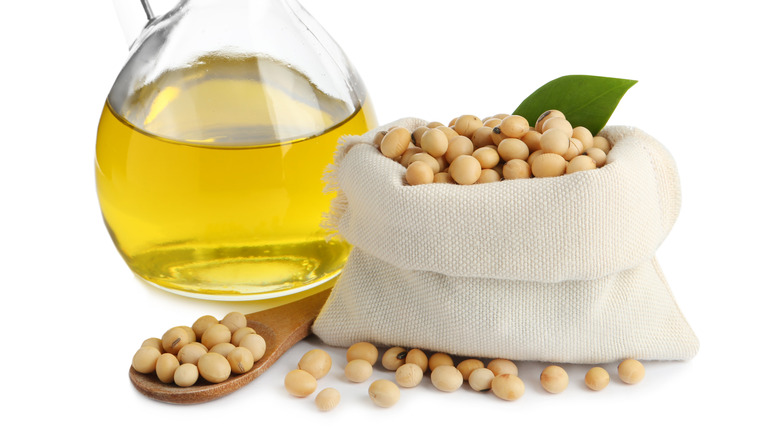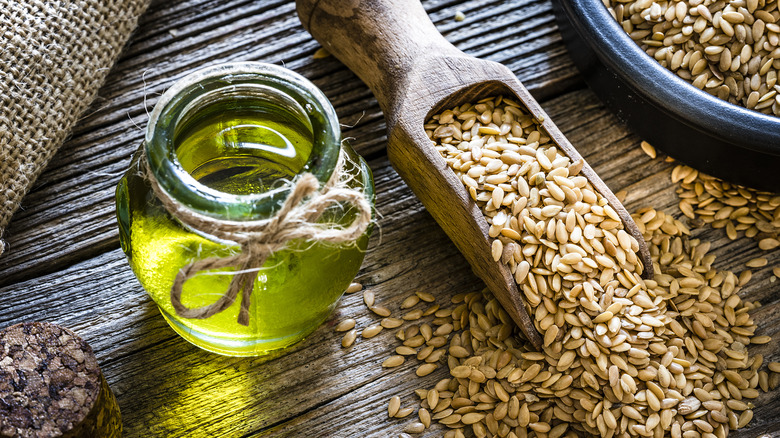The Best Type Of Fats To Consume To Lower Cholesterol Fast
During your physical, your doctor told you your cholesterol was a little high. Your triglycerides were edging toward where you might need a bit of medication. So, you're on a mission to lower your cholesterol in any way possible. While cutting fat out of your life might seem like an easy fix, some fats may actually help lower your cholesterol.
According to the Harvard T.H. Chan School of Public Health, it's not the amount of fat you eat but the type that's important. Unsaturated fats, which many consider healthy fats, can lower your risk of developing heart disease and overall cholesterol. Including these in your diet in moderation is essential to improving your overall heart and cardiovascular health.
With that said, a few sources of unsaturated fat top the list when you're trying to lower your cholesterol quickly. Take control of your health by understanding the science behind how these fat sources can improve your wellbeing.
Olive oil is shown to lower cholesterol
When you're trying to reduce your cholesterol levels and need a good all-around oil, olive oil is an excellent choice. This flavorful oil has a green color reminiscent of the olives that created it and is abundant in monounsaturated fat (oleic acid). Per Healthline, this acid makes up nearly three-fourths of the total oil and has potential in reducing inflammation. According to a study in the Journal of Epidemiology, oleic acid consumption significantly reduced serum high sensitivity C-reactive protein (CRP) levels. Per the Mayo Clinic, high CRP levels indicate inflammation in the body.
Olive oil is also shown to reduce low-density lipoprotein (LDL) cholesterol, the "bad" cholesterol in the blood linked to clogged arteries and heart disease. A 2019 analysis in Critical Reviews in Food Science and Nutrition showed that consumption of olive oil decreased total cholesterol and improved LDL cholesterol levels better than other plant oils. Cardiologist Dr. Sarah Samaan noted (via WebMD) that replacing butter with olive oil can lead to a reduction of LDL cholesterol of up to 15%, comparable to "a low dose of medication."
Avocado oil improves heart health
You might know that adding a bit of avocado is good for your health. For example, avocados can make your carrots healthier. But it's not just the green fruit that will improve your health. When looking for fats to help lower your cholesterol, consider swapping out your canola oil for a bit of avocado oil. Like olive oil, avocado oil is rich in oleic acid, according to Healthline. But it also has a higher smoking point than olive oil for sautéing those foods you love (via Time Magazine).
A study in the Journal of Functional Foods showed that replacing butter with avocado oil can help lower cholesterol. It also illustrated that substituting avocado oil could help counteract some of the negative impacts of a breakfast full of saturated fats. Additionally, research published in Disease Markers looked at how avocado oil can reduce LDL cholesterol without affecting HDL cholesterol levels. Evidence suggests that avocado oil may reverse some inflammatory processes, which is good for heart health.
In addition to helping your cholesterol, avocado oil demonstrated effects similar to losartan in reducing blood pressure. A study in Nutrition examined how avocado oil alone could reduce blood pressure by up to 20%. Reduced blood pressure works alongside cholesterol reduction to lower your heart attack and stroke risk.
Consume soybean oil to reduce cholesterol
Lowering your cholesterol isn't something that will happen overnight, but soybean oil can help it happen sooner rather than later. Soybean oil is one of those oils with a high smoke point, so it's good for cooking most dishes. It's also full of polyunsaturated fatty acids, which Healthline notes are associated with many heart-healthy benefits. These types of fat, in moderation, are also suitable for lowering the risk of heart disease.
A study in PLOS Medicine demonstrated that replacing saturated fats with polyunsaturated fats like soybean oil could lower the likelihood of having coronary heart disease. In fact, the study found that increased consumption of polyunsaturated fats leads to a ten percent reduction in coronary heart disease. Additionally, research in Experimental and Clinical Cardiology found that consumption of polyunsaturated fatty acids may help prevent cardiovascular disease.
Meanwhile, a 2021 review published in Nutrition indicated that soybean oil can lower circulating cholesterol levels and doesn't cause inflammation. Findings also suggested that replacing saturated fats with soybean oil lowered blood cholesterol levels. In other words, including soybean oil in your diet could positively contribute to your overall health.
Reduce your cholesterol levels with flaxseed oil
Perhaps you've noticed the flaxseed oil pills in the vitamin aisle of your local drug store, promoted as supplements that can help you lower your cholesterol. This isn't just fancy marketing: Flaxseed oil is made up of alpha-linolenic acid (ALA), an omega-3 fatty acid, which can favorably change inflammation markers. Research in The Journal of Nutrition illustrated that a diet with ALA could help inhibit vascular inflammation and improve heart health.
The ALA in flaxseed oil might even be able to lower LDL cholesterol when consumed in moderation. A 2015 study in the Nutrition Journal examined adult males who used corn oil and flaxseed oil daily. While the study was small, it did indicate that consuming flaxseed oil was beneficial in lowering the subjects' LDL cholesterol levels.
Flaxseed oil isn't typically suitable for cooking, as it has a low smoke point. But it's a great addition to your dressings, sauces, or smoothies.





